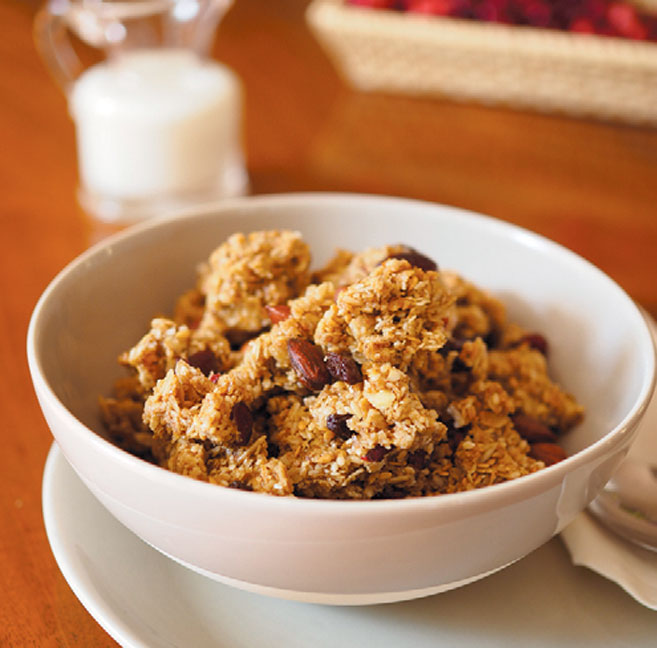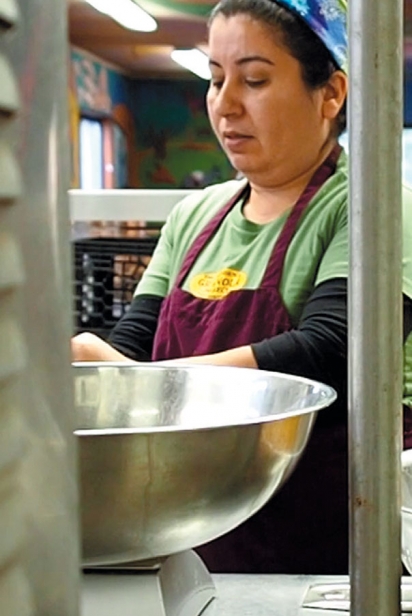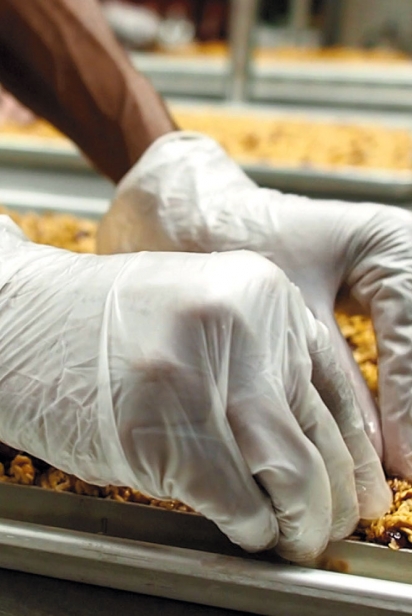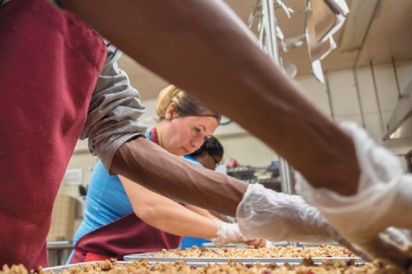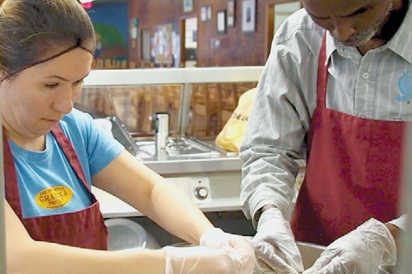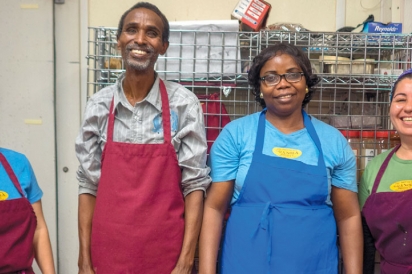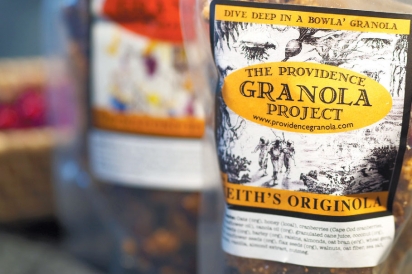Providence Granola Project
Changing the Lives of Refugees
Delicious and Wholesome Products Tempt Our Taste Buds and Teach Workplace Skills
What’s not to like about granola? Eaten out-of-hand, it makes a tasty and quick snack; with fresh fruit and milk, it’s a delicious breakfast. The Providence Granola Project (Providence Granola) makes granola in such decadent and mouthwatering flavors as Cherry Chocolate, Maple Rosemary and Blackberry Cobbler. And since the granola is made by refugees who gain basic job-training skills and steady employment in the process, the taste is all the sweeter.
Established in 2008, Providence Granola, now part of Beautiful Day (a nonprofit organization founded in 2012), has a three-fold mission, says Providence Granola co-founder Keith Cooper: Provide job training for immigrants in Rhode Island who are unlikely to otherwise find gainful employment, and educate community members about refugees and refugee resettlement, all by making and selling delicious artisanal granola.
Cooper and his lean professional staff, including Anne Dombrofski, director of strategic partnerships, work out of the Social Enterprise Greenhouse, a co-working space in Davol Square in Providence.
Why did they settle on granola instead of, say, peanut butter or hot sauce?
“It’s simple, really,” he says. “I had a recipe I liked and Geoff Gordon [Providence Granola’s co-founder] was a granola fan.”
Granola also offers practical benefits. Unlike many other foods, granola can be made in different kitchens with minimal equipment, an oven and a stovetop. Making granola requires a lot of hands-on work, especially at Providence Granola.
“We’re kind of reverse engineering the product to maximize the amount of hand labor,” Cooper says. “Every bit of [the production and packaging] is done by hand—that’s crucial to what we do.”
That hand labor is done by a small team at Amos House, a soup kitchen and comprehensive social service agency in Providence. On one recent evening the kitchen team is introduced: Evon Nano, from Iraq, is the kitchen manager and job-trainer; and Bolajoko (Bola) Sanni, from Nigeria, is the assistant manager. Both women have jobs in other commercial kitchens, as well.
On that night, Siyad Abdullahi is the lone trainee, although two or three trainees typically work each shift. Abdullahi, a Somali refugee, came to the United States in July 2015 after living for years in a Kenyan refugee camp. Despite the language barrier, a wide smile and hearty handshake accompany his enthusiastic “hellos,” before he turns to carefully labeling granola bags.
The trainees are immigrants—often, but not always, refugees—who have come recently to the United States. They attend classes at the Dorcas International Institute of Rhode Island (Dorcas) and, through its assessment process, have been identified as less likely to find employment within the next year, given their lack of first-language literacy and absence of English skills.
“If we can speed up someone’s entry into the job market from a year or more to between three and six months … there’s a huge benefit,” says Cooper. At the same time, however, he acknowledges that, as one individual, he can only make a small overall impact.
While Dorcas, a merger of the International Institute of Rhode Island and Dorcas Place Adult and Family Literacy Center, provides case management services for refugees, Providence Granola focuses on the gap in refugee services—job training, or “on-ramping to employment,” says Cooper, executive director of Beautiful Day. “When I go to … refugee resettlement conferences, the job developers are really interested in what we’re doing.”
Nano, who sometimes relies on hand gestures to explain tasks, trains individuals in their first jobs. Early on, trainees might apply labels to the bags of granola; stir the liquid slurry of oil, sweeteners and seasonings to a hearty boil; and rotate pans of dry ingredients in and out of the ovens. Skills that are second nature for most citizens—opening a bank account, signing a time sheet and navigating the bus system—are new challenges for many of these refugees.
“We’ve set up a situation where everybody works and works hard but there’s a friendly atmosphere and a lot of grace … if someone doesn’t show up,” Cooper says thoughtfully. “One of the lessons about work is learning how to get to work on time. Sometimes there’s simple confusion. Like them, I’ve lived in other countries—houses and streets can all look alike at first.”
The soft-spoken yet passionate Cooper grew up in Southeast Asia. That international exposure, coupled with positions at a campus ministry, where he developed his passion for cooking large quantities of food for groups of people, and at the International Institute of Rhode Island, fuels Cooper’s dedication to make awesome food, help refugees and educate Rhode Islanders. Eventually, he says, he would love to establish an incubator kitchen for refugee entrepreneurs; Nano, for example, hopes to run her own catering company.
Trainees earn a $10 hourly stipend from Providence Granola; they also attend classes at Dorcas and seek work. Of the entry-level jobs they eventually get at warehouses, restaurants, hotels or laundries, Cooper says, “These are not living wage jobs but … they support themselves—they have to be very frugal.”
While most immigrants receive about 100 hours of training at Providence Granola, Cooper plans to invest 400 hours in training a new administrative assistant from Iraq, whom he describes as very bright but lacking computer experience. “People can’t afford to stop and go to school,” says Cooper, who is affectionately called “Mr. Keith” or “Teacher” by many who work at Providence Granola. “We’re trying to provide some kind of an interim place where work is a primary form of education or preparation.”
On Monday and Tuesday nights, from around 4 to 11 pm, Providence Granola takes over two Amos House kitchens. Downstairs, Sanni measures and mixes dry ingredients, while Nano measures liquid ingredients. Although different flavors of granola call for some ingredient changes, “Keith’s Originola,” for example, includes oats, walnuts, almonds, pecan meal, wheat germ, oat fiber, sesame seeds, sunflower seeds, raisins and dried cranberries.
“The most complicated thing about making great granola is the ratio of sugars and oil to each other, and that ratio to the amount of grains,” says Cooper, who taste-tested each flavor of granola four or five times before declaring it ready for consumers. With Gordon, who designed the labels, Cooper brainstormed ideas for and names of different flavors.
In the first-floor kitchen, Sanni fills a number of roasting pans with dry ingredients (other than the nuts and berries) and slides them into the ovens for the first of several cycles of baking. After the dry ingredients cool, they are combined with the syrup, nuts and berries, and brought to room temperature. Only then is the granola broken into large chunks and placed in labeled bags, which are then sealed. On a typical night, they produce 130 pounds of granola; when demand is particularly strong, the team works an additional shift.
When asked why people should buy Providence Granola products, Nano quickly replies, “To help refugees.” She adds with unassuming pride, “The taste is the best. Keith’s [Originola] recipe is … not an easy recipe.” Nano calls Pistachio Cardamom, which she and Cooper cooperatively developed, and Bourbon Pecan her favorite flavors. Because new trainees, many of whom speak no English, are often a bit afraid, she says, “I always tell them, ‘I am a refugee like you, so you don’t have to be afraid of me.’”
Although selling granola at most farmers’ markets is not a money-maker for Providence Granola, Cooper remains committed to the resulting education and community outreach: Trainees practice their English and shoppers learn more about refugees and refugee resettlements. Of such encounters, Cooper says, “Meeting a refugee in person … there’s some power there.” Those who don’t shop at farmers’ markets can also find Providence Granola at several coffee shops and independent groceries across Rhode Island.
Now that Providence Granola has developed and sells more than a dozen granolas, along with a variety of granola bars—including such flavors as the gluten-free Beautiful Bar and low-gluten Bananas Foster, Mochaccino Hazelnut and Salted Mango—it’s expanding into new culinary territory to both increase revenue and train more refugees. In the newest venture, “Going Nuts,” Providence Granola will make and sell glazed mixed nuts at farmers’ markets and online. A “Going Nuts” campaign on Indiegogo (an online crowd-funding engine) is helping to raise money and expand Providence Granola’s social media reach.
Although some key pieces of “Going Nuts” are still in development, including final taste-testing and the packaging, Cooper envisions packaging the glazed mixed nuts in two- or three-ounce containers and marketing them as gift items. The different glazes—Lemongrass Coconut, Rosemary Sage and Root Beer—have been taste-tested by people at farmers’ markets and at a “Going Nuts” launch party.
The granola syrup’s fragrant aroma lingers in the early evening air. That scent and Beautiful Day’s abiding commitment to refugee resettlement—one individual at a time—make all of Providence Granola’s products delectable and soul-satisfying treats.
Hungry for Providence Granola?
If your stomach is growling for granola, check out the flavors of granola, granola bars and mixed nuts (coming soon) made by the Providence Granola Project—and where to find them! Please note: Monthly flavors sometimes vary
Regular Granola Flavors:
Keith’s Originola
Breakfast Muesli
Ginger Zinger Muesli
Granola Flavors of the Month:
Amaretto Pear (January)
Cherry Chocolate (February)
Pistachio Cardamom (March)
Mochaccino Hazelnut (April)
Bananas Foster (May)
Piña Colada (June)
Blackberry Cobbler (July)
Mango Pomegranate (August)
Maple Rosemary (September)
Caramel Apple Corn (October)
Bourbon Pecan (November)
Holly Jolly Ginger (December)
Granola Bar Flavors:
Beautiful Bar
Mochaccino Hazelnut
Pistachio Cardamom
Salted Mango
Bananas Foster
Mixed Nuts (coming soon):
Lemongrass Coconut
Rosemary Sage
Root Beer
Farmers’ Markets (see page 59)
Aquidneck Growers’ Winter Market
Coastal Growers’ Winter Market
Wintertime Farmers’ Market in Pawtucket
Coastal Growers’ Market (summer/fall)
Hope Street Farmers’ Market
(summer/fall)
Brown University Farmers’ Market (fall)
Online Purchases
Buy online at
ProvidenceGranola.com/shop/
Stores and Restaurants
Visit ProvidenceGranola.com/locations/
Providence Granola is seeking additional
outlets to sell its products. Contact them
at 508.955.0747 or
providencegranola@gmail.com.


